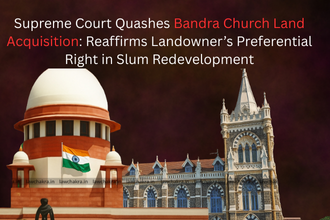Introduction
In a landmark ruling on August 22, 2025, the Supreme Court of India reaffirmed that landowners hold a preferential right to redevelop slum-affected property, quashing the Slum Rehabilitation Authority’s (SRA) acquisition of land owned by the Basilica of Our Lady of the Mount (Bandra Church). The case, Saldanha Real Estate Pvt. Ltd. vs. Bishop John Rodrigues & Ors., highlights the delicate balance between slum dwellers’ rehabilitation, landowners’ rights, and state intervention under the Maharashtra Slum Areas (Improvement, Clearance and Redevelopment) Act, 1971.
The judgment not only protects the rights of institutional landowners like religious trusts but also establishes stronger constitutional safeguards against arbitrary actions by statutory bodies such as the SRA.
Background of the Case
The dispute centered on a 1,596 square meter plot in Bandra, Mumbai, part of a larger 10,000 sq. m. property owned by the Church.
- Historical context: Hutments had been standing on the land since the 1930s. Portions of the land were notified as a slum in 1978 and again in 2002.
- 2019 Development: Slum residents formed a housing society and tied up with Saldanha Real Estate Pvt. Ltd., submitting a redevelopment plan to the SRA.
- Church’s objection: The trust argued that any redevelopment must be part of a composite project covering the entire Church property, not a fragmented effort led by a society-developer nexus.
- 2021 Proposal: The Church submitted its own redevelopment proposal. However, the SRA rejected it, citing non-compliance with prescribed format and alleged delay beyond the 120-day statutory window.
- Acquisition proceedings: The SRA initiated acquisition under Section 14 of the Slum Act, 1971, favoring the slum society’s proposal.
The Bombay High Court (June 2024) intervened, ruling in favor of the Church and setting aside the acquisition. The decision was appealed by the society, the developer, and the SRA before the Supreme Court.
Arguments Before the Supreme Court
Appellants (Slum Society, Developer, and SRA)
- The Church had failed to act within time and neglected the slum dwellers for decades.
- The 2018 amendments to the Slum Act required landowners to take timely initiative for redevelopment, which the trust failed to do.
- The slum society’s plan had active consent of the residents and thus deserved priority.
Respondent (Church Trust)
- The trust’s proposal was timely when calculated from the date of formal communication of slum notification.
- The Supreme Court’s COVID-19 orders extending limitation periods protected its submission.
- Rejection for not being in “prescribed format” was a hyper-technical ground, especially when feasibility reports and supporting documents were already prepared.
- Ignoring the trust’s proposal violated legislative intent and constitutional fairness.
Supreme Court’s Observations
The bench of Justices Surya Kant and Ujjal Bhuyan delivered a decisive ruling in favor of the Church.
Key Findings:
- Preferential Right of Landowners
- The Court emphasized that owners of slum land have the first right to redevelop their property.
- The SRA cannot sideline this right in favor of a developer-backed housing society without due process.
- Invalid Rejection of Church Proposal
- The trust’s proposal could not be rejected merely for technical defects.
- The Court held that substantive compliance and the intent to redevelop were more important than rigid formalities.
- Arbitrary Action by SRA
- The Court found evidence that the SRA, developer, and society acted in tandem to sideline the Church.
- Such conduct was declared arbitrary, unconstitutional, and violative of fairness principles.
- Acquisition Proceedings Vitiated
- Since the trust’s statutory rights were not respected, the acquisition process under Section 14 of the Slum Act was unsustainable.
- The Court restored the landowner’s control, affirming the Bombay High Court’s decision.
Legal Significance of the Judgment
This ruling strengthens the legal position of landowners in redevelopment disputes and offers clarity on the interpretation of the Maharashtra Slum Act.
- Constitutional fairness: Reinforces that state authorities cannot bypass procedural fairness while favoring private developers.
- COVID-19 extensions recognized: Acknowledges that statutory timelines must be interpreted flexibly in light of judicial orders extending limitation.
- Checks on statutory bodies: The judgment serves as a warning against collusion between housing societies, developers, and authorities.
Implications
For Landowners
- Religious trusts, institutional bodies, and private owners now have judicial backing to assert their preferential redevelopment rights.
For Slum Dwellers
- While the ruling protects landowners, it also ensures that slum rehabilitation schemes are not hijacked by developer-driven interests.
- Slum residents can still benefit if the landowner integrates them into a composite redevelopment plan.
For Developers and SRA
- Developers cannot rely solely on housing society tie-ups to bypass landowners.
- The SRA must exercise its powers transparently and within statutory limits.
Conclusion
The Supreme Court’s decision in Saldanha Real Estate Pvt. Ltd. vs. Bishop John Rodrigues & Ors. is a landmark ruling that reaffirms the preferential right of landowners in slum redevelopment projects. By quashing the Bandra Church land acquisition, the Court has sent a strong message: redevelopment cannot come at the cost of landowners’ statutory and constitutional rights.
At its core, the judgment ensures a fair balance between slum rehabilitation and property rights, preventing arbitrary state action and safeguarding the integrity of the redevelopment process.



